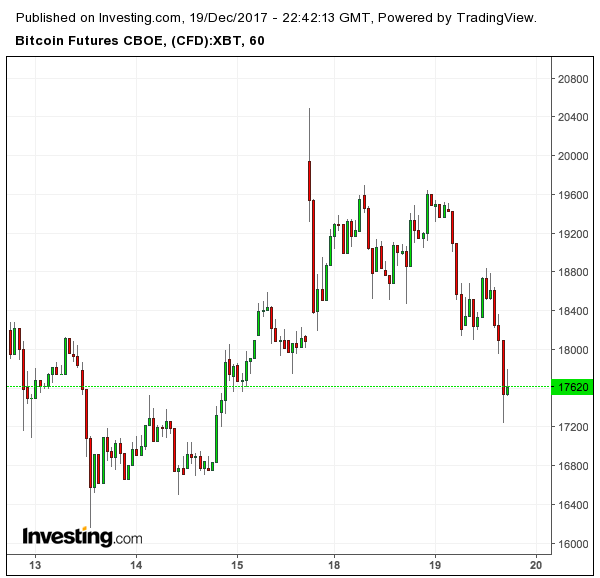Bitcoin Futures — What they are and should you care?

BITCOIN FUTURES
The Chicago Mercantile Exchange group & Cboe Global Markets Inc have officially joined in on the bitcoin hype sweeping the planet. The wolves of Wall Street have been salivating for quite some time about how they could get a piece of the cryptocurrency pie, and now they are getting their first taste. Last week Cboe launched the U.S.’s first “bitcoin futures” contract. This week, CME — the world’s largest futures exchange launched its own bitcoin futures contract. Has Bitcoin now officially hit the mainstream?
You probably have heard about Bitcoin by now. If not, then here is a great technical explainer. The highlights are: in 2009, an anonymous entity called “Satoshi Nakamoto” published a white paper that synergized “cryptographic” and “digital ledger” technologies into a concise protocol we now call — The Blockchain. In essence, it was a way to store and trade value over an “embedded” trust system which tracks all transactions on a digital public ledger. In keeping the network “secure,” miners (entities running advanced cryptographic programs) would be given a reward in the form of a “bitcoin.” In the past few years, bitcoin and blockchain projects have exploded in popularity. Here we are, eight years since the debut of the white paper, and bitcoin is at an all time high not only in monetary value but also seeping into cultural nooks and crannies. Case in point, at least in the financial industry, is Bitcoin Futures.
The reader now knows at least a cursory notion of what bitcoin is, so what is a bitcoin future? Before we get into the importance of bitcoin futures and how that could affect you as an investor, entrepreneur, or regular user we first have to get your head wrapped around the idea of what a “future” is.
A future is a type of contract that allows two parties to exchange an asset at a specific price at a predetermined time in the future. Basically it is placing a bet on whether the price of an asset will be more valuable or less valuable when the contract comes due. In trader speak, you could take the “short” — bet that the price of the asset will fall below the specific agreed price; or you could take the “long” — bet that the price of the asset with rise above the specific. For every long there is a short, and for every short there is a long.
Still confused? Try this example: You buy a future contract of an asset (corn/oil/wheat & now bitcoin) and bet that its price goes up or down at a certain point in time. For the sake of example, let’s say bitcoin is back to $500 right now, and you think (or correctly thought) the price is going to go higher. You might buy a future at $550 with an expiration date of one month later. If the price of bitcoin is $600 when the contract expires, you just won the $50 difference prize!
The first CBOE contracts will expire on Jan. 17, 2018, and the first CME Group contracts will expire on Jan. 26, 2018. So what happened when the futures went live? Well nothing out of the ordinary — good or bad… which is overall a great thing.. I think?

Here is what CNBC reported after the first day of trading on the Cboe: “The futures contract, which trades under the ticker XBT and expires in January, settled up 7.8 percent Friday at $18,105 — a 17.1 percent gain in their first week of trading.
Full-day trading volume in the January contract had hovered closer to 1,000 and 1,500 in the last few days after nearly 4,000 contracts on the first day. Total trading volume across all three contracts was 4,127. That’s still relatively small compared with futures for the Cboe’s volatility index, whose daily trading volume typically ranges from the tens of thousands to more than 100,000.
Earlier this week, CME bitcoin futures contracts exchanged about $80 million worth of value in the first day of trading, beating out smaller rival — COBE — who said they exchanged around $75 million worth of contracts. As investopedia puts it: “Overall, the launching of bitcoin futures by Cboe and CME will facilitate price discovery and price transparency, enable risk-management via a regulated bitcoin product and give a further push to bitcoin as an accepted asset class.” TD Ameritrade announced that although they would not allow immediate futures trade on the CME exchange, they would however allow a select subset of customers to trade the CBOE futures contracts starting this week.
And this is only the beginning… Coindesk’s recent article states that NYSE Arca has submitted a filing to the Security and Exchange Commission for a “proposed rule change that would allow for the listing of two exchange-traded funds tied to bitcoin futures…The filing is a notable one, given the recent momentum behind financial products connected to the cryptocurrency market. While the past few months have seen several filings with the SEC related to cryptocurrency-tied ETFs, NYSE Arca’s submission suggests that at least some of those proposed products are entering the agency’s formal approval stage.
THE TAKEAWAY
So what does that mean for you, oh reader? Well it depends on what you are and what your goals are. If you are a lowly advocate of the crypto space with light investments in multiple coins like me, then this doesn’t really affect you personally other than the tides of overall market forces. If you are a smaller investor or someone wanting to test the market then you have three choices of play: long, short, or non-play (waiting). Do you believe Bitcoin will be less or more valuable in a month’s time? Whatever your answer then trade accordingly. Lastly, if you are a larger scale investor or professional trader then this is the first legitimized effort by centralized authority(s) to help open the door to wider participation in bitcoin trading. To the regular person, this news isn’t going to knock anyone over with it’s implications. However, it may just be the first genuine sign of the traditional financial services sector caving, or at least accommodating, to the will and popularity of a new digital technology — Bitcoin & cryptocurrencies at large.
Patrick Tompson of CoinTelegraph had a great anecdote that I think would be fitting to end with:
“Similar to futures contracts and the majority of Bitcoin price lately, this is pure speculation. Maybe nothing will happen at all and I’m over thinking how the market will react, maybe Jan.17 and 26 will not be significant dates for the Bitcoin economy. However, this is not my first rodeo. And if you’ve been a member of crypto community for quite some time now, you could see that the days leading up to a new or major event in the Bitcoin economy and the days shortly after are more than likely to see significant movements in Bitcoin price.”
Cureativ is hosting the 3rd annual State of Digital Money conference on May 5th, 2018. If you would like to hear from industry leaders discuss the evolving trends and emerging technologies disrupting the global financial system and worldwide transactions, then register for SODM and we will eagerly await your participation in our community (Facebook, Twitter, LinkedIn, & weekly email Newsletter) in the runup to the event date. Finally, if you, or anyone you are networked with represent product/services that solve some of the impending problems facing digital money, then we would love to hear from you about amplifying your voice to hyper-interested parties through our sponsorship opportunities. We look to hearing from each of you and your attendance next May 18’. Until next time!
“Thanks for reading this. If you liked this, please share and resteem so GREAT CONTENT can spread!”
More info about Nicholas McCay:
https://about.me/nicholasrmccay
Nice article.
Thank You.
Thanks for your good posts, I followed you!